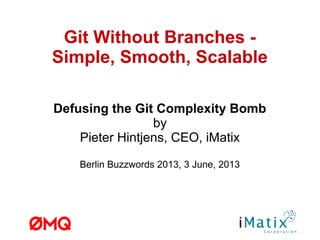Git Without Branches - Simple, Smooth, Scalable
- 1. Git Without Branches - Simple, Smooth, Scalable Defusing the Git Complexity Bomb by Pieter Hintjens, CEO, iMatix Berlin Buzzwords 2013, 3 June, 2013
- 2. Git is easy... ... once you understand that a git branch is just a folded five- dimensional lepton space that has a detached history with no intervening cache.
- 3. Git makes me feel stupid ŌŚÅ (I love git... but) ŌŚÅ Inconsistent and arbitrary commands ŌŚÅ Too many concepts to learn ŌŚÅ Too many ways to make mistakes ŌŚÅ Too much space for opinion ŌŚÅ Every team has to invent a strategy
- 4. Git-flow is a popular strategy ŌŚÅ Has base branches (master, develop) ŌŚÅ Has feature branches ŌŚÅ Has release branches ŌŚÅ Has hotfix branches ŌŚÅ Has support branches ŌŚÅ Has its own git extensions ŌŚÅ Is this making life simpler?
- 5. Complexity ŌŚÅ Engineers just enjoy making stuff ŌŚÅ Complexity makes us feel stupid ŌŚÅ We make mistakes ŌŚÅ We lose confidence ŌŚÅ We fight over ŌĆ£unicorn policiesŌĆØ ŌŚÅ Outcome: projects that don't scale
- 6. The Git Complexity Bomb ŌŚÅ Branching is a poor solution for poor processes ŌŚÅ Complexity oriented design & trash oriented design ŌŚÅ The process becomes harder to fix ŌŚÅ You can't fix just part of this picture ŌŚÅ Defusing the bomb needs a holistic intervention
- 7. Simplicity Some quotes from my favorite author: ŌŚÅ ŌĆ£Simplicity beats functionality, every timeŌĆØ ŌŚÅ ŌĆ£If you can't understand it on a cold Monday morning before coffee, it's too complex!ŌĆØ ŌŚÅ ŌĆ£Design by removing problems, not adding featuresŌĆØ
- 8. Simplicity Oriented Design ŌŚÅ Small patches to precise problems ŌŚÅ Fork + pull request for every single patch ŌŚÅ Contributor-maintainer ping-pong ŌŚÅ Accuracy over speed ŌŚÅ Community over code ŌŚÅ Bundled up as C4.1 protocol
- 9. In Practice ŌŚÅ Development repo has 1 branch = master ŌŚÅ Pull requests always applied to master ŌŚÅ Travis CI for builds & regression tests ŌŚÅ Stable releases are forked off ŌŚÅ Cherry pick fixes from master to stable
- 10. Branches vs. Forks ŌŚÅ How complex is the organization? ŌŚÅ What's the change latency? ŌŚÅ What is the learning curve for newcomers? ŌŚÅ How many ways can we screw up? ŌŚÅ How much upfront coordination do we need?
- 11. Branches vs. Forks ŌŚÅ Who owns what we make? ŌŚÅ Can our agreements survive arguments? ŌŚÅ How safe is my code from your errors? ŌŚÅ How visible is this project? ŌŚÅ How large can the project scale?
- 12. Does it work? ŌŚÅ We switched ├śMQ in Dec 2011 after much talk ŌŚÅ Initial reactions: mixed and apprehensive ŌŚÅ After 18 months, ~70 contributors (from 2-3) ŌŚÅ Dev master is perfect most of the time ŌŚÅ Community is happy, and we use this widely ŌŚÅ Easy to learn, and smooth to drive
- 13. Conclusions ŌŚÅ Git branches are part of a ŌĆ£complexity bombŌĆØ that may be damaging your projects ŌŚÅ By switching to a better development process you eliminate the need for branches ŌŚÅ The result is a simpler, kinder Git that is much easier to learn, and safer to use ŌŚÅ And that gives you larger, more successful projects
- 14. If you want to try this ŌŚÅ Read C4.1 (rfc.zeromq.org/spec: 22) ŌŚÅ Look at a project that uses it ŌŚÅ Read my ŌĆ£ZeroMQŌĆØ book (O'Reilly), Chapter 6
- 15. Thanks! ŌŚÅ See you here tomorrow at 12pm for an explanation on how we're doing security for ZeroMQ ŌŚÅ Email me: ph@imatix.com ŌŚÅ Twitter: @hintjens ŌŚÅ Blog: hintjens.com














